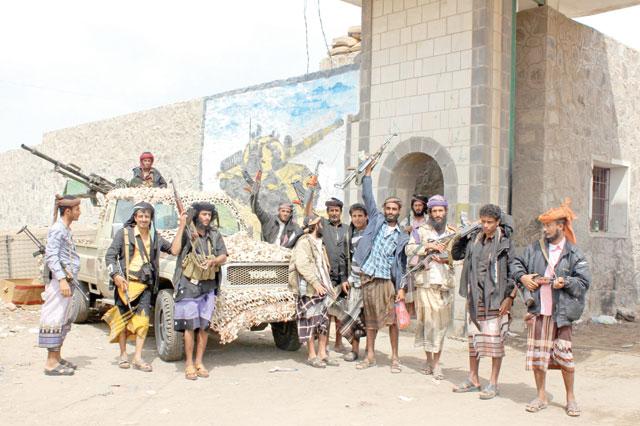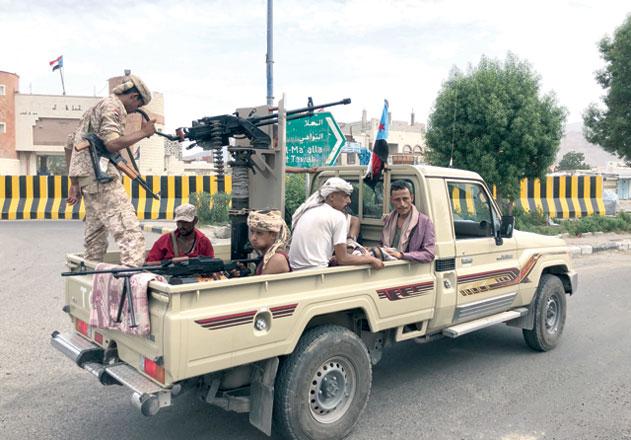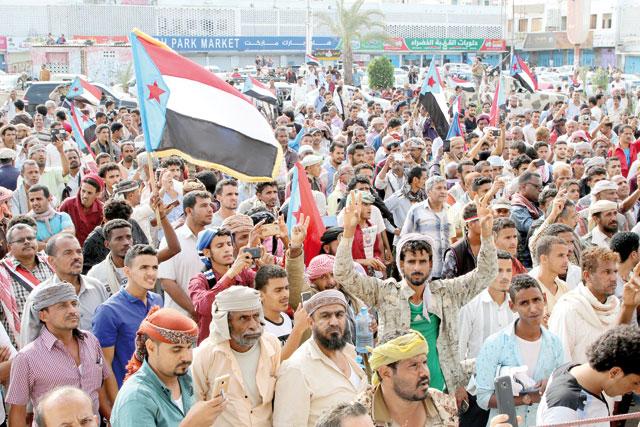You are here
Yemen separatists surround Aden presidential palace
By AFP - Jan 31,2018 - Last updated at Jan 31,2018

Fighters from the separatist Southern Transitional Council and their supporters parade around the area of the presidential palace in the government’s de facto capital Aden, moving closer to taking full control of the southern city, on Tuesday (AFP photo)
ADEN — Separatists in war-ravaged Yemen have surrounded the presidential palace in the government’s de facto capital Aden, moving closer on Tuesday to taking full control of the southern city.
The government has accused the separatists of attempting a coup in Aden, where more than 36 people have been killed in clashes that opened yet another front in the country’s devastating conflict.
The southern port city has served as the government’s base since 2014 after the Iran-backed Houthi rebels — who hail from northern Yemen — took control of the capital Sanaa in their fight against the state.
While President Abed Rabbo Mansour Hadi now resides in Riyadh, two military officials said Prime Minister Ahmed Bin Dagher and a number of senior government figures were holed up in the Aden presidential palace.
“The separatists have surrounded the palace and now control the main gate. Those inside are unofficially under house arrest at this point,” said a high-ranking officer with the Yemeni army.
For three years, Hadi’s Saudi-backed administration was allied with the separatists, driving the Houthi rebels out of the south and back into their strongholds in the north.
But tension between the allies began to surface in April when Hadi dismissed a Cabinet minister and the Aden governor in a move that was widely seen as reflecting divisions among his supporters.
Tensions boiled over into armed clashes between the separatists and pro-government forces on Sunday, fuelling chaos in the impoverished Arabian Peninsula country where a civil war has already left thousands dead and millions on the brink of starvation.
Demand for self-rule
Under the self-proclaimed Southern Transitional Council (STC), the separatists have gained traction since April in their push for self-rule, demanding the reinstatement of South Yemen as an independent entity.
The STC this month called on Hadi to make changes in his government, accusing him of corruption and mismanagement.
The clashes have sparked fears of a repeat of the 1986 South Yemen civil war, a failed socialist coup which killed thousands in just six days and helped pave the way for the 1991 unification of South and North Yemen.
The separatists, who enjoy popular support and are backed by some military troops, have rapidly gained control over all but one district in Aden since Sunday.
More than 36 people have been killed and 186 wounded in Aden in two days, according to the International Committee of the Red Cross.
Brigadier Saleh Al-Sayyed, who heads troops that have fought alongside the separatists since Sunday, announced his forces had seized control of the Fourth Brigade, the presidential guard in Aden.
Yemen’s president has urged Saudi Arabia and its allies to intervene in the government’s defence.
The coalition said it would take “all necessary steps to restore security” but has not announced any new operation to help the government in Aden since Sunday.
Ceasefire plea
More than 9,200 Yemenis have been killed since the coalition intervened in the war in 2015, triggering what the UN has called the world’s largest humanitarian disaster.
Nearly 2,200 more have died of cholera amid deteriorating hygiene and sanitation conditions, the World Health Organisation says.
The United Arab Emirates is a key member of the military alliance, but also has close ties to one of the leaders of the STC — Hani bin Breik, the cabinet minister sacked by Hadi in April.
The UAE has trained a special operations force in the Yemeni army, dubbed the “security belt”, stationed in southern Yemen.
The force supports the STC. Some troops in the Yemeni army are also loyal to the separatists.
Both the coalition and the Hadi government have called for an immediate ceasefire in Yemen, and the interior ministry has publicly called on state troops to stop fighting.
The coalition on Monday called on the separatists to exercise restraint while urging the Yemeni government to “take into consideration the demands of the social and political movement” in the south.
Related Articles
ADEN — Yemeni ministers were holed up in Aden's presidential palace on Wednesday after separatist forces seized effective control of the sou
ADEN — Yemen government forces reclaimed the interim capital Aden and its presidential palace on Wednesday, a minister said, pushing back se
ADEN, Yemen — Four people were killed on Monday in a second day of fighting between rival factions seeking control of the southern Yemeni po














